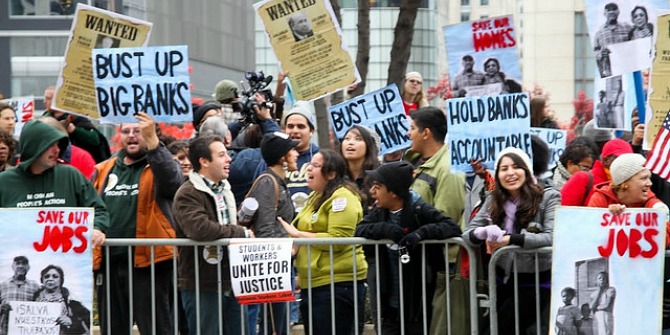In Whoops! John Lanchester manages to easily transform the often obscure and inaccessible jargon of the financial world into accessible and user friendly terms, without patronising or belittling the reader. Angela Garcia-Calvo feels that the book makes for a light and accessible overview of the economic crisis, but a lack of detail will leave more experienced readers disappointed.
 Whoops! Why Everyone Owes Everyone and No One Can Pay. John Lanchester. Penguin. 240 pages. October 2010.
Whoops! Why Everyone Owes Everyone and No One Can Pay. John Lanchester. Penguin. 240 pages. October 2010.
John Lanchester attempts to explain in an accessible style the intricacies of the recent financial crisis, asserting that the credit crunch was the result of four interlinked phenomena: a climate, a problem, a mistake, and a failure. The climate was one which supported a victorious post-Cold War capitalism, which in turn supported the problem of the easy availability of sub-prime mortgages across America and the UK. The mistake refers to the use of problematic models of risk used throughout the banking landscape, and the failure rests with the financial regulators for not preventing the crisis. Lanchester unpacks these four elements using a mix of economics and sociological arguments, aiming to give his readers a real insight into why the UK’s economy is in such a dire state.
Lanchester opens by providing an easy to follow explanation of financial instruments, which is by far the highlight of the book. The author manages to easily transform the often obscure and inaccessible jargon of the financial world into accessible and user friendly terms, without patronising or belittling the reader. The connections between new financial products, changes in risk-taking incentives and the surge in the real estate market are also very well developed.
By Lanchester’s account, financiers grossly miscalculated the risks they were taking as the mathematical models being used were based solely on historical price information, but hardly took into account basic human reactions in times of crisis. These same financiers had risen to prominence in the US and the UK thanks to a culture where making money mattered more than making goods. Central bankers, immersed in that same neoliberal culture, failed to see the warning signs of the crisis and therefore to take preventive measures. The result was of course a massive bill for the average taxpayer, incalculable damage to the lives of those whose houses were repossessed, and a lengthening global crisis.
Lanchester often punctuates his points with side stories about relevant academics, financiers and policy officials; these are poignant and memorable narratives about those who suffered the direct impact of the mortgage meltdown. Personal anecdotes about the author, his background and his personal experience in the UK real estate market also make for an amenable read and contribute to the author’s aim of accessibility.
Although the book is very readable, much more attention could have been paid to the analysis of the regulatory environment and where exactly it failed. Importantly, some of the information presented appeared upon closer inspection to be inaccurate; for example, in his description of the UK property market Lanchester asserts that Britain is a European exception in terms of its rate of high home ownership, but in fact the Spanish rate of home ownership is considerably higher than in the UK. Additionally, it was obvious that only examples which supported the author’s line of thought were discussed and other important ones were dismissed.
The book ends with several ambiguous conclusions, and there is little in the way of tangible proposals (although of course one could argue that politicians have not been forthcoming either). Lanchester’s comment that “it’s time to slow down, calm down and decide how to make the finance industry back into something which serves the rest of society rather than predate it” is painfully generic and offers little insight into what exactly the financial industry should become or what we may do to achieve this objective.
Overall Whoops! makes for a light and accessible overview of the economic crisis, but a lack of detail will leave more experienced readers disappointed.
——————————————————————————————-
Angela Garcia-Calvo is a PhD student in the European Institute at the London School of Economics. Read more reviews by Angela.






